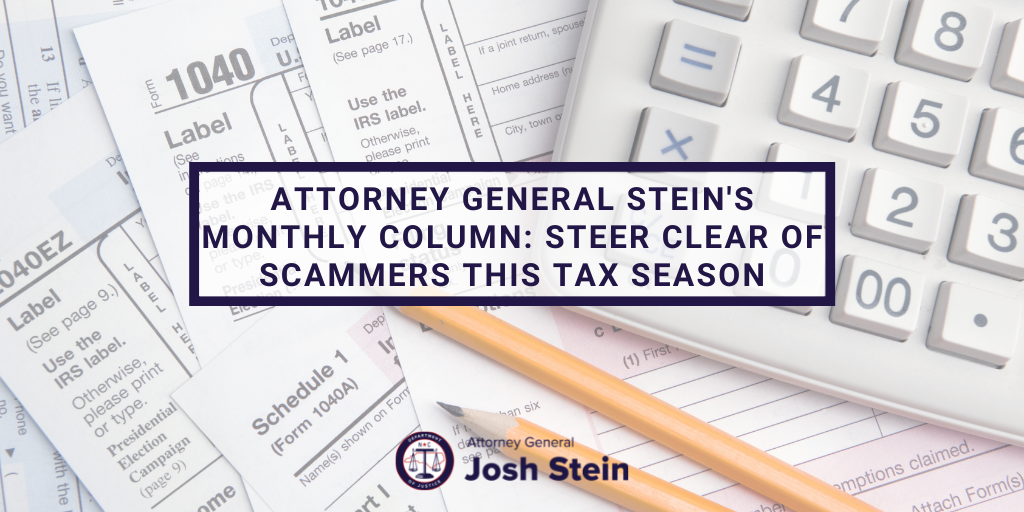
Steer Clear of Scammers this Tax Season
Attorney General Josh Stein
March 2022
It’s tax season, which means scammers are out in full force looking to take advantage of hardworking North Carolinians. Each year, my office hears from North Carolinians struggling to file their taxes while fending off fraudsters. Tax scams put people’s money and personal information at risk, but my office is here to help you avoid them. Here are some tips to help you file your taxes safely.
Guard your personal information. Identity thieves can use your Social Security number to take out loans, open credit cards, or even collect your tax refund. Remember, email is vulnerable to hackers, so avoid emailing your Social Security number or other confidential information to a tax preparer or accountant. If you’re using a website to file your taxes, make sure your information is secure by looking for the lock icon and https:// in the address bar.
Watch out for fraudulent tax filings in your name or business. Whenever thieves gain access to your personal information, they can use it to file taxes under your name and pocket your refund. If you receive a notice or letter from the IRS indicating that more than one tax return was filed in your name, respond immediately to the IRS employee whose contact information was provided.
Beware of scammers posing as the IRS. If you get a call from someone claiming to work with a government agency, chances are they’re a crook. Unless you have received written communication from the IRS that outlines your tax debt, the IRS is unlikely to call you to collect. Ask them for the caller’s name and identification number. Then, hang up, look up the agency’s telephone number on a government website, and call the agency directly to confirm the information. If anyone demands you make immediate payments using gift cards, money orders, or wire transfers, hang up the phone – it’s a scam.
Before you use a paid tax preparer, check their credentials and paperwork. Verify that your preparer has a Preparer Tax Identification Number (PTIN) – without one, they can’t prepare a tax return for a paying client. You can find a preparer’s PTIN through the IRS tax preparers directory. Also, check with our office at 877-5-NO-SCAM or the Better Business Bureau to find out if the preparer has any complaints filed against them. Keep in mind that taxpayers making $73,000 or less can use free tax preparation software through the IRS at www.irs.gov/efile.
Think twice before you opt for an instant or rapid refund. Some tax preparers and banks offer a refund anticipation check (RAC). This is a paid service for taxpayers who don’t have a bank account to use for direct deposit of their refund, or don’t have the money to pay for tax preparation assistance. There’s a fee (typically about $30) to set up the RAC system. The preparer deducts that fee, their tax preparation charges, and other fees from the eventual refund. After all that, there may not be much of your actual refund left.
Tax season can be a stressful time. With these tips, you can save yourself from the added headache scammers create. If you believe you have been the victim of tax scam, contact my office at 877-5-NO-SCAM or file a complaint online at https://ncdoj.gov/complaint.
